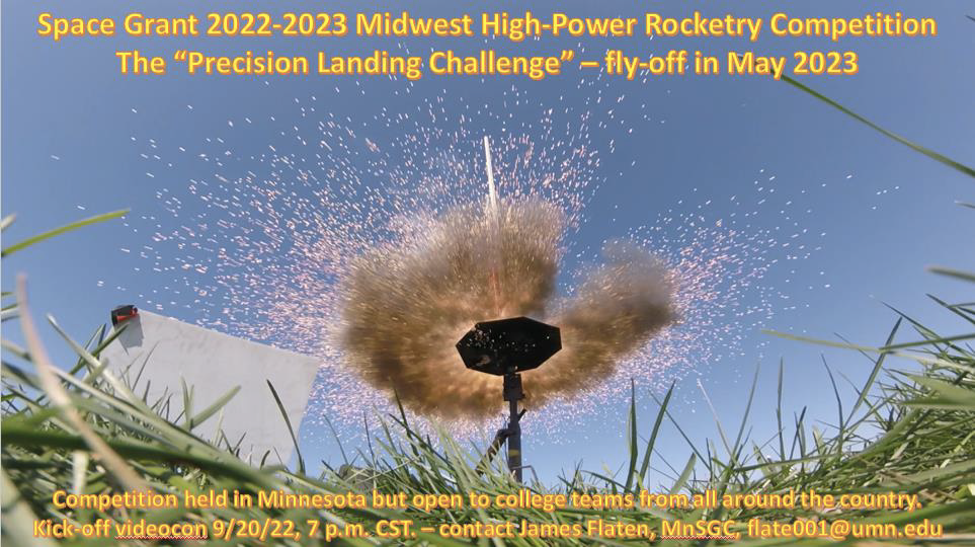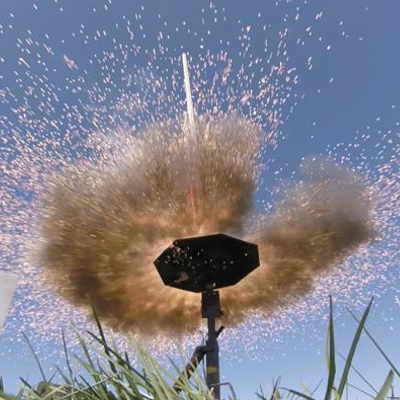The Minnesota Space Grant Consortium in association with the Tripoli, Minnesota, High-Power Rocketry Club, announces the 2022-2023 Space Grant Midwest High-Power Rocketry Competition. The fly-off will be held in Minnesota, but this competition is open to college and university student teams from across the nation during the 2022-2023 academic year.
This competition is an opportunity for students to design and construct high-power rockets to be launched in May 2023 from a Tripoli High-Power Rocket Club launch site just north of Minneapolis.
No previous experience in high-power rocketry is necessary to compete!
Up to 30 college and university teams, sponsored by their states’ Space Grant consortiums, will be accepted into this competition.
Interested teams from any state, not just those in the Space Grant Great (Lakes) Midwest Region, are required to garner local Space Grant “sponsorship” (this might or might not involve financial support, depending on the state) then submit a non-binding “Notice of Intent to Compete” to the MnSGC by October 1, 2022, in which they list the team’s student members and student certification levels (if any), team name, and a committed faculty adviser.
(Note – institutions not planning to form a team until spring 2023 still should also submit a Notice of Intent to Compete by Oct. 1, 2022, naming a faculty adviser (so that we know who to send updates to.))
Teams are also required to consult with a non-student mentor who has high-power rocketry experience and is Level 2 certified (or higher). Competition organizers can help teams find a certified high-power rocketry mentor, if need be.
A kick-off/informational videocon will be held from 7 to 8 p.m. CST on Monday, Sept. 19, 2022, for teams planning to spend the full academic year on this project. This kick-off/informational videocon will be repeated on Thursday, Jan. 12, 2023, for teams working just during the winter/spring term(s).
A registration fee of $400 per team†, due by Jan. 31, 2023, will be charged to cover competition costs, of which up to $100 may be applied toward the purchase of motors for use at the in-person competition fly-off.
States sponsoring two or three teams will be expected to provide one judge for written and oral reports and the (in-person) competition fly-off. States fielding four or more teams may be asked to provide two judges.

2022-2023 “Precision Landing Challenge”
(summary description)
Students teams will design and construct a single motor, single stage, high-power rocket that will fly twice during the competition. The challenge is (A) to use a steerable parachute during a totally-unpowered descent to guide the rocket booster to land as close as possible to a specified ground target, probably about 1,000 feet from the launch pad; and (B) to land the booster so that it remains upright. (Aside: The booster is allowed to separate from, and descend independently from, the upper section of the rocket, as long as all parts of the rocket land at safe speeds and are recovered in re-flyable condition.)
Rockets will fly first on a Cesaroni 273-H-225-14A “White Thunder” (2-grain, 38 mm diameter) motor, and must exceed 1,000 feet AGL (Above Ground Level). The second flight will have a target apogee as close as possible to, but not exceeding, 3,000 feet AGL, and can be on any Cesaroni or AeroTech I-class or J-class 54 mm diameter motor.
The rocket must carry a “non-commercial” (i.e. not sold for rocketry) data-logging sensor suite to characterize flight performance, including logging (at least once a second) GPS, av-bay pressure, 3-axis acceleration, and 3-axis rotation. The booster must also contain a look-up and look-down camera system, to collect video of the rocket motor boosting, the rocket separating, the steerable parachute in action, and the rocket landing. Bonus points will be given to teams whose members increase their certification level using individually-built rockets (which will be unrelated to the (team-built) competition rocket described above).
Additional details about the competition will be included in a handbook. Note that all fabrication work on the rocket(s), except for possibly machining of plastic and/or metal parts, must be performed by students.
The competition will include two written reports about the design, analysis, simulation, build, and test flight results of the
competition rocket, an oral presentation, plus a written assessment of competition flight data/results. These will be scored by a
panel of professional engineers from both academia and industry. Scoring of the pre-fly-off reports and the post-flight reports
will focus on rocket design and performance. More details about the competition motors, reports, deadlines, etc. will be described
in a competition handbook and discussed during the informational videocons.
A competition handbook, including a more-extensive description of the challenge rules, will be posted here by 9/20/22.
Logistical questions may be directed to James Flaten, Minnesota Space Grant, University of Minnesota Twin Cities: flate001@umn.edu.
Technical questions may be directed to Gary Stroick, Tripoli, Minnesota, High-Power Rocketry Club:
president@offwegorocketry.com.
IMPORTANT DATES:
• Kick-off and informational videocon: Monday, Sept. 19, 2022 (repeated Thursday, Jan. 12, 2023) from 7 to 8 p.m. Central Time (contact James Flaten, flate001@umn.edu, for call-in information)
• Garner your state’s Space Grant sponsorship and submit a (Non-binding) “Notice of Intent to Compete” by Oct. 1, 2022
• A non-refundable $400 Team Registration Fee† is due by Jan. 31, 2023, of which up to $100 may be applied toward the purchase of competition motors
• In-person Competition dates (one weekend earlier than in 2021-2022): Presentations & Safety Checks on Saturday, 5/13/23* (mid-afternoon & evening); flights on Sunday, 5/14/23* (all day, plus an evening banquet)
• Alternate (Weather-delay) flight date: Monday, 5/15/23* (as long as needed)
† Schools that entered teams in the COVID-aborted 2019-2020 Space Grant Midwest High-Power Rocketry Competition that did not use their registration credit in 2021-2022 may request to have their previous registration applied to this new competition, but may not extend this registration credit beyond 2022-2023.
* If Minnesota has a particularly wet spring and the launch site clearly will not be useable by mid-May, the competition dates might need to shift. This will be announced in as far in advance as is practical. See details in the handbook.
